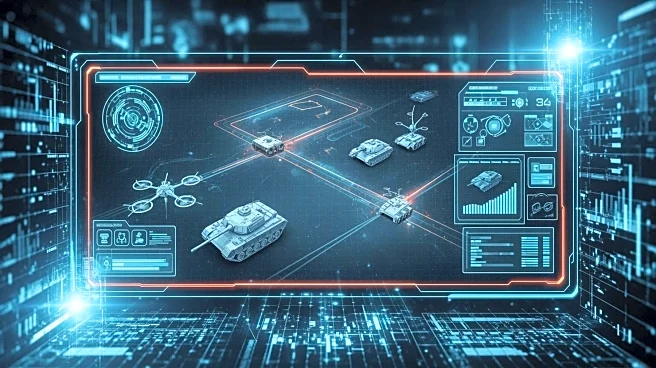What's Happening?
BAE Systems showcased its Ground Requirements in Digital (GRID) system at the Association of the United States Army (AUSA) conference in Washington, DC. The system highlights BAE's digital engineering capabilities, focusing on digital twins used in their
products. Jamie Hoyt, senior director of engineering for BAE Systems, emphasized the importance of digital engineering in developing solutions for modern battlefield challenges. The Virtual Proving Ground in Sterling Heights, Michigan, plays a crucial role in this initiative, allowing engineers to collaborate with customers and partners to test digital twins in simulated real-world scenarios. The GRID system models mission effectiveness at a formation level, integrating various mission equipment packages and evaluating their interactions and economic implications.
Why It's Important?
The emphasis on digital engineering by BAE Systems represents a significant shift in defense technology development. By utilizing digital twins and virtual environments, BAE Systems can enhance the efficiency and effectiveness of military equipment, potentially leading to more robust and adaptable battlefield solutions. This approach allows for comprehensive testing and evaluation of equipment packages, improving protection and operational capabilities. The integration of digital engineering could lead to cost-effective solutions, benefiting both the military and defense contractors by optimizing resources and reducing development time.
What's Next?
BAE Systems is likely to continue expanding its digital engineering initiatives, potentially leading to further advancements in military technology. The collaboration with customers and partners at the Virtual Proving Ground suggests ongoing development and refinement of solutions tailored to specific battlefield needs. As digital engineering becomes more integral to defense strategies, other companies in the sector may adopt similar approaches, fostering innovation and competition in military technology development.
Beyond the Headlines
The adoption of digital engineering by BAE Systems could have broader implications for the defense industry, including ethical considerations related to automated systems and the balance between human and machine decision-making in combat scenarios. Additionally, the focus on digital twins and virtual testing environments may influence how military training and operations are conducted, potentially leading to shifts in military doctrine and strategy.
















